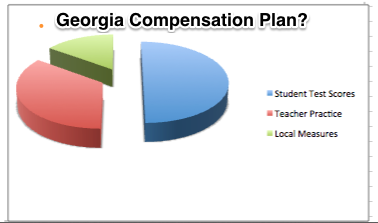“High-stakes plan could change teachers pay,” is the title of an article in the Atlanta Journal-Constitution paper. The article is a good review of the history behind why the state is going to move to “merit” pay, and how the Race to Top grant that Georgia won in 2010 provided the funds and a mandate to pay teachers on the basis of performance. But earlier this year, the Superintendent of Education, Dr. John Barge, a Republican (who has announced he will run for governor in 2014 against Republican Nathan Deal), said that the merit plan will not be implemented in the 26 districts that are part of the Georgia’s RTT.
However, Marietta City and Fulton County Schools, who are part of the RTT, are charging ahead with a merit based plan, and have hired the same Boston company to help them spend their money.
Using merit pay plans, especially if they are tied to student achievement scores, are based on incorrect conclusions.
Student achievement scores on high-stakes examinations are the preferred strategy of paying teachers for performance, or service rendered to its employer. The idea here is that if students do well on achievement tests, then the teacher should be rewarded–more pay. On the other hand, if the kids don’t do so well on the tests, then what? Punish the teacher? Less pay?
In Marietta, Georgia, the Marietta Board of Education has announced that it will freeze teacher salaries, and “float” the idea among faculty and staff of the school district that it might be better if they were paid based on performance and not on experience and their education level.
Marietta and Fulton County teachers are in jeopardy because the plan that the school boards and superintendents want to put in place to decide teacher compensation will be based on unscientific and unreliable methods. I’ve reported horror stories describing how outstanding and experienced teachers received poor evaluations here, here, and here. The plan will use student achievement, and other methods as shown in Figure 1.

Figure 1. There will be three pieces to the compensation plan for Georgia teachers, and the largest piece will be based on erroneous student test scores.
Student achievement tests were not designed to measure teacher or administrator performance. They were designed to measure student learning, but for years researchers have warned not to try and make connections between student test scores and teacher performance. The measure that is actually used is the Value Added Measure (VAM), and it is just as unreliable as the student test scores used to generate a VAM number.
One noted educational research blogger (Crazy Crawfish, aka Jason France, former Louisiana Department of Education data analyst), said this about the use of VAM in his state:
Many of you may be familiar with VAM, or Value Added Modeling. This is a teacher evaluation system that uses student test scores to evaluate teachers’ performance. The data used for Louisiana’s system is fraught with errors. The premise behind the system is flawed. And as it turned out, Louisiana’s system was corrupted on the inside for political reasons.
Diane Ravitch reported on her blog that researchers at the Atlanta Journal have uncovered a “surprising number of errors, though not surprising to those familiar with the testing industry.”
Anthony Cody, former Oakland teacher, and educational blogger at Education Week, has studied the research related to VAM scores. As we all know, the make up of the kids in your class will have a great deal to do with their performance. He said this about VAM scores and types of classes:
teachers who taught more remedial classes tended to have lower value-added scores than teachers who taught mainly higher-level classes. “That phenomenon was not due to the best teachers’ disproportionately teaching the more-rigorous classes, as is often asserted. Instead, the paper shows, even those teachers who taught courses at more than one level of rigor did better when their performance teaching the upper-level classes was compared against that from the lower-level classes.”
Georgia is headed down a path that will end up creating more problems that it solves. This plan will not improve student achievement, nor will it lead to the improvement of the quality of teaching. What it will do is demoralize teachers who have worked for years to improve what happens in the classroom.
And finally I would add this quote from Diane Ravitch’s new book, Reign of Error: The Hoax of the Privatization and the Danger to America’s Public Schools.
Yet the myth persists that the teacher is primarily responsible for student scores and that great teachers can overcome the influence of family, poverty, disability status, language proficiency, and students’ own levels of interest and ability. Certainly, there are many people whose lives were changed by one teacher, but their stories typically describe teachers who were unusually inspiring, not “the teacher who raised my test scores to the top.” Teachers do have the power to change lives. But after more than a decade of No Child Left Behind, researchers are still searching for a nonselective school or a district where every student, regardless of his or her starting point, has achieved proficiency on state tests because that school or that district has only effective teachers. (Ravitch, Diane (2013-09-17). Reign of Error: The Hoax of the Privatization Movement and the Danger to America’s Public Schools (Kindle Locations 2144-2145). Knopf Doubleday Publishing Group. Kindle Edition).
Marietta and Fulton County teachers, this is a heads up.


You must be logged in to post a comment.